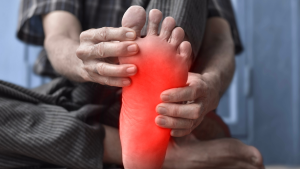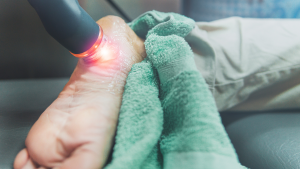Nerve pain in the feet can make daily activities feel more challenging than usual. Early signs often include tingling, burning, or numbness that gradually becomes harder to ignore. These symptoms can be a sign of peripheral neuropathy, a condition that develops when the nerves in the feet become damaged or irritated.
Patients receive expert neuropathy care in Columbus, GA from podiatrists with specialized training in nerve-related foot conditions. A thorough evaluation helps identify the underlying cause and determine the most effective treatment options. With an accurate diagnosis and a personalized plan, many individuals can reduce discomfort, improve mobility, and protect the long-term health of their feet.
Table of Contents
What Are the Symptoms of Neuropathy in the Feet?
Neuropathy in the feet can show up in different ways. Some symptoms start slowly and get worse over time. Common signs include:
- Tingling or “pins and needles”
- Burning or stabbing pain
- Numbness or trouble feeling hot or cold
- Pain or sensitivity from socks or shoes
- Weakness or feeling unsteady
- Trouble sensing pressure or changes on the floor
When nerves don’t work well, it becomes easier to miss injuries like cuts or blisters. This is why early care from a foot specialist is important.
Why Foot Neuropathy Develops: Common Causes and Risk Factors
Foot neuropathy can develop for several reasons. Diabetes is one of the most common causes, but other conditions may also contribute, including:
- Low vitamin B12 or other vitamin problems
- Long-term alcohol use
- Side effects of certain medications
- Autoimmune or inflammatory illnesses
- Past foot or ankle injuries
- Poor circulation or vascular disease
Sometimes the cause is not clear. A podiatrist checks all possible factors to create the best treatment plan.

How Neuropathy Is Diagnosed in the Feet
A correct diagnosis helps guide treatment. During an exam, a podiatrist may check:
- Sensation with vibration, light touch, or pin-prick
- Reflexes and muscle strength
- Foot structure, alignment, and the way a person walks
- Blood flow in the feet and legs
- Skin, nails, and pressure points
If needed, nerve tests, bloodwork, or imaging may be done. Understanding the cause helps create an effective plan for relief.
Foot Treatment for Neuropathy: Effective Options That Help Relieve Pain
The best care for neuropathy often includes several treatments. A podiatrist looks at the cause of the nerve damage and the patient’s daily needs.
Symptom-Relief Methods for Neuropathy Pain
- Topical and oral treatments for burning or tingling
- Anti-inflammatory approaches to support nerve health
- Nutrition supports correcting vitamin deficiencies
Orthotics, Support, and Balance Improvement
- Custom orthotics to reduce pressure and improve support
- Supportive shoes to protect sensitive areas
- Balance and strengthening exercises to improve stability
Daily Foot Protection to Prevent Injury
Because feeling in the feet may be reduced, daily care is important. This includes checking the feet for cuts, keeping skin moisturized, and watching for redness or pressure spots. These steps help prevent serious problems.
Laser Treatment for Foot Neuropathy: How It Helps Nerve Pain
MLS laser therapy is a modern, non-invasive treatment. Many patients find it helpful for nerve pain. It uses light energy to:
- Support healing
- Improve blood flow
- Reduce inflammation
- Help damaged tissue recover
It is painless, drug-free, and a strong option for people looking for safe relief.
Long-Term Management for Neuropathy in the Feet
Neuropathy often needs ongoing care. With regular checkups, many patients experience:
- Less burning and tingling
- Better balance and walking
- Fewer injuries
- Improved activity and movement
Good long-term results depend on early treatment and follow-up visits with a foot specialist.
What to Expect During a Neuropathy Evaluation in Columbus, GA
During a visit, the podiatrist will ask about symptoms, health history, and daily habits. A physical exam is then done to check nerve function, foot structure, and circulation. After reviewing the results, the podiatrist creates a plan to reduce nerve pain and protect long-term foot health.
Home Care Tips for Protecting Neuropathic Feet
Daily habits can help prevent problems. Good home care includes:
- Checking feet every day for cuts or changes
- Wearing cushioned, supportive shoes
- Avoiding walking barefoot
- Keeping blood sugar controlled (for those with diabetes)
- Reporting new symptoms right away
These steps can help avoid small problems that may become serious if not treated.
Take the First Step Toward Neuropathy Relief
Neuropathy symptoms—like burning, tingling, and numbness—can interrupt daily life. Expert neuropathy care can bring relief and improve comfort.
A Columbus podiatrist can evaluate symptoms and recommend the right treatment. Patients can schedule online or call the office at 762-800-1044 to take the next step toward healthier, more comfortable feet.






